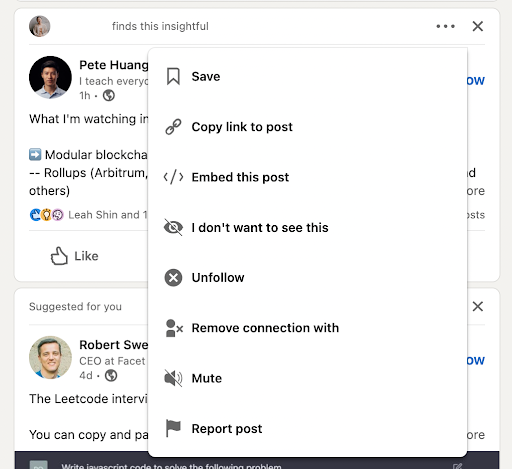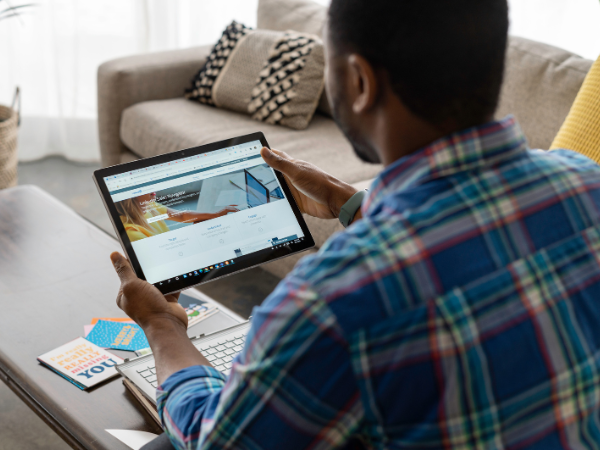
What Really Works On LinkedIn? Answers From The LinkedIn Team
Want to know what kinds of content should you be posting to LinkedIn? What’s the best time of day to post it? How many hashtags should you be using? And how does all of this impact LinkedIn’s algorithm?

Product Marketer @ LinkedIn
Whether you are a seasoned social media professional or just getting started on leveraging the power of LinkedIn, it can be easy to fall prey to some of the most common misconceptions about this powerful social network. Knowing what is true and what isn't when it comes to LinkedIn marketing can make all the difference in creating a successful strategy.
What kinds of content should you be posting to LinkedIn? What’s the best time of day to post it? How many hashtags should you be using? And how does all of this impact LinkedIn’s algorithm?
To help us answer our questions, we spoke to Hien Mai, from the LinkedIn Product Marketing team. Hien focuses on growing creators and conversations on LinkedIn by helping make content creation approachable, nudging & nurturing creators along their journey towards being a consistent creator.
In this post, we’ll take a look at seven popular assumptions about how LinkedIn works and share answers and suggestions that come directly from their team.
What should I post on LinkedIn? What kind of conversations make the most sense for the platform?
We welcome all sorts of professional conversations on LinkedIn and want people to share content that feels authentic to them so they can have meaningful conversations. LinkedIn should reflect real-life conversations in the workplace.
These could be:
- Parents seeking and sharing advice about balancing work, childcare, and generally life
- Members seeking advice or tips about topics or industries they are interested in
- Commentary and opinions on newsworthy topics or industry news
We see LinkedIn as a place to have these conversations and a place where professionals come together to share information, ideas, and expertise with their connections.
What does it mean to be professional when it comes to content on LinkedIn?
The best thing you can do is be authentic and talk about what is important to you. This could mean asking advice about carving a different career path for yourself, firing your imposter syndrome, recognizing important milestones, taking time for your mental health, or reflecting on what work-life balance means to you. Professional growth and personal growth are very much intertwined, and conversations on LinkedIn should be about all of it. LinkedIn is a place to have authentic conversations, not limited to one topic or the other because so many of those things go hand in hand.
Being professional on LinkedIn means being respectful to all members of the LinkedIn community. All types of people come to LinkedIn seeking both professional and personal growth. It’s important to provide an environment where everyone feels safe and comfortable enough to share their experiences and insights in a genuine way. You can inspire others who might be dealing with a similar situation.
What shows up in my Feed on LinkedIn, and why?
When you go to the feed of your home page on LinkedIn, you will see content relevant to your professional interests, like conversations from your network and people you follow. There are also companies you follow, sponsored content, and other posts that we believe you may be interested in.
Our feed uses algorithms to learn about your interests, and together with our human editorial team, help add engaging content to your feed. Our technology and teams also help filter out low-quality and unsafe content to ensure that what you see on your feed adds value to your professional journey.
To influence what you see on your feed, we recommend you follow people and companies you want to hear from, and engage with their content when it interests you. You can also subscribe to newsletters and Top Voices in your industry to help discover professionally relevant content.
Tell us what you want to see less of by clicking the three dots (...) on a post. This opens a toolbox of options available, including unfollowing or removing a connection with another member, reporting the post, or letting us know that you’re not interested in the author or topic by clicking “I don’t want to see this.”

Some of the most widely read and distributed content are the posts that contribute ideas, insights, and inspiration, unlocking a world of knowledge, opportunities and collaboration.
We’re continuing to work on ways to improve the content you experience on LinkedIn, surfacing authentic, relevant, and substantive conversations to help you grow as a professional.
What is the best time of day to post on LinkedIn?
It depends on your audience. More people come to Linkedin during the weekdays than weekends, but it’s more important to consider when your audience is tuning in. It may make sense to optimize towards evening posts for those returning to the platform after work or keeping to weekdays versus weekends. Think more about how you can add a unique perspective around timely topics, like current affairs and industry trends your audience would be interested in.
How often should I post on LinkedIn?
Daily posting is optimal to maintain consistent engagement with your audience, but be sure not to overdo it and avoid overwhelming your audience.
While some in your network will want to hear from you often, others may feel overwhelmed when people post more than once per day. It is important to understand how your audience engages with your content and how often to inform your posting frequency. If your comments and engagement on a post remains consistent, that’s a good sign that your content is engaging.
How can I effectively use hashtags on LinkedIn?
While hashtags help viewers identify what a post is about and find other relevant posts about the same thing, they are not the only tool to help to distribute your posts more widely. Hashtags work best when they are closely related to what the post is about.
LinkedIn Hashtag Best practices:
- LinkedIn recommends between 1-3 hashtags per post for optimization.
- Low-quality content, as marked by overly heavy hashtag use, may be blocked or dramatically reduced visibility by LinkedIn’s algorithm.
- Hashtags that are trending on other platforms aren’t always a good fit for LinkedIn. Search the hashtag before adding to your content.
- Use hashtags with relevant context by separating them throughout the copy, sparingly.
- Do not tack unnecessary hashtags to the end of posts, it may actually hurt your reach potential.
What type of content works best on LinkedIn?
It’s best to diversify the types of content you post to see what drives the most engagement with your audience. Experiment with different types of content and figure out what your audience engages with the most.
Want to know more about how LinkedIn works and how to grow your following? Check out our exclusive webinar with LinkedIn expert Zander Van Gogh: Watch the webinar.
Try Buffer for free
180,000+ creators, small businesses, and marketers use Buffer to grow their audiences every month.
Related Articles

TikTok just introduced Bulletin Boards, similar to Instagram's Broadcast Channels. Here's what you need to know.

We've reopened submissions for the new, cohort-based version of the Buffer Guest Post Program. Learn more in this article.

In this article, you'll find 20+ essential LinkedIn statistics that reveal the platform's reach, effectiveness, and continued growth.